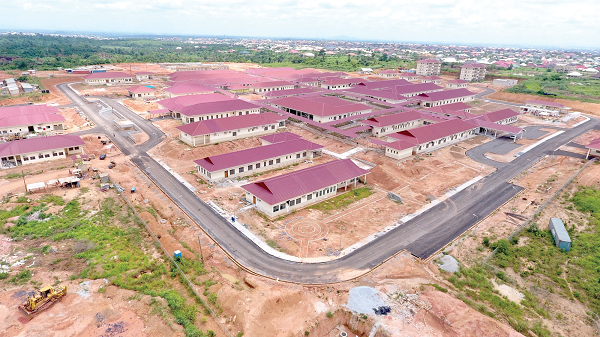
Audio By Carbonatix
The recent commissioning of the incomplete Sewua Hospital by President Akufo-Addo has sparked widespread criticism, with Euroget De-Invest S.A. labeling the act as illegal and a breach of contract. This incident highlights deep concerns about governance, contractual integrity, and the prioritization of political optics over the welfare of Ghanaians.
A Breach of Trust and Accountability
The decision to commission a hospital that is incomplete not only misleads the public but also undermines accountability. Such actions give the illusion of progress while ignoring the reality that the facility is not ready to deliver the essential healthcare services it was intended to provide. This erodes public trust and raises questions about the government’s commitment to genuine development.
Moreover, the reported contractual breach with Euroget De-Invest S.A. sets a troubling precedent. International contractors and investors are likely to perceive Ghana as a country that does not respect agreements, which could have long-term repercussions for foreign investment and development projects.
The Risk to Healthcare Delivery
Hospitals are critical to the welfare of citizens, and commissioning an incomplete facility compromises its ability to function effectively. Healthcare delivery depends on adequate infrastructure, equipment, and staffing. Without these, the facility may become a hollow structure, unable to meet the needs of patients, ultimately putting lives at risk.
Political Optics vs. Public Welfare
This act appears to prioritize political gain over the genuine needs of the people. Using an unfinished hospital as a tool for political publicity undermines the principle of putting the welfare of citizens first. Such practices diminish confidence in leadership and governance, tarnishing the image of the presidency.
Recommendations for the Way Forward
1. Complete Before Commissioning:
It is imperative that no project is commissioned until it is fully completed, equipped, and ready to serve its intended purpose. Thorough inspections by relevant stakeholders must confirm a project’s readiness before any public ceremony is held.
2. Respect Contracts and Legal Frameworks:
The government must honor its contractual obligations to maintain credibility with partners and stakeholders. Any deviations should be renegotiated transparently with all parties involved.
3. Transparency in Project Reporting:
Public updates on the status of projects should be honest and transparent. This ensures citizens are accurately informed about the progress of development initiatives.
4. Strengthen Oversight Mechanisms:
Independent institutions such as the Auditor-General’s office and the Public Procurement Authority must be empowered to prevent premature commissioning of projects and ensure efficient use of public resources.
5. Acknowledge and Rectify Errors:
President Akufo-Addo must publicly acknowledge this misstep, explain the rationale behind the premature commissioning, and assure the public of the project’s completion. Such a move would demonstrate accountability and a willingness to learn from mistakes.
Conclusion
The premature commissioning of the Sewua Hospital is a regrettable misjudgment that prioritizes optics over substance. This act risks undermining public trust, contractual relationships, and healthcare delivery. Moving forward, the government must adopt a more transparent, accountable, and results-oriented approach to public project management to ensure the genuine needs of Ghanaians are met effectively and responsibly.
This is not just about one hospital; it is about restoring faith in governance and ensuring that leadership truly serves the interests of the people.
Latest Stories
-
Ghana is rising again – Mahama declares
4 hours -
Firefighters subdue blaze at Accra’s Tudu, officials warn of busy fire season ahead
4 hours -
New Year’s Luv FM Family Party in the park ends in grand style at Rattray park
4 hours -
Mahama targets digital schools, universal healthcare, and food self-sufficiency in 2026
4 hours -
Ghana’s global image boosted by our world-acclaimed reset agenda – Mahama
5 hours -
Full text: Mahama’s New Year message to the nation
5 hours -
The foundation is laid; now we accelerate and expand in 2026 – Mahama
5 hours -
There is no NPP, CPP nor NDC Ghana, only one Ghana – Mahama
5 hours -
Eduwatch praises education financing gains but warns delays, teacher gaps could derail reforms
5 hours -
Kusaal Wikimedians take local language online in 14-day digital campaign
6 hours -
Stop interfering in each other’s roles – Bole-Bamboi MP appeals to traditional rulers for peace
6 hours -
Playback: President Mahama addressed the nation in New Year message
7 hours -
Industrial and Commercial Workers’ Union call for strong work ethics, economic participation in 2026 new year message
9 hours -
Crossover Joy: Churches in Ghana welcome 2026 with fire and faith
9 hours -
Traffic chaos on Accra–Kumasi Highway leaves hundreds stranded as diversions gridlock
9 hours

